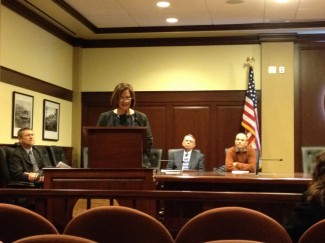Chloe Rambo
Argonaut
BOISE — It’s a brand new plan and quickly gaining nods from Idaho education heavyweights.
Michael Ferguson, director of the Idaho Center for Fiscal Policy, released an alternative budget plan at a press conference Monday that brings to light inequities that Gov. C.L. “Butch” Otter’s suggested budget serves to public schools and educators.

Chloe Rambo | Argonaut
Cindy Wilson presents Jan. 20 in support of the Idaho Center for Fiscal Policy’s alternative budget plan.
Called the “Responsible Alternative to the Executive Budget,” Ferguson said the fiscal policy center’s alternative budget offers a more responsible and sustainable foundation for Idaho than Otter’s.
“While (the alternative budget) reflects a vastly different set of priorities than embodied in (Otter’s budget), it relies on the Executive Budget for the basic parameters and framework used in developing a state budget,” Ferguson said. “It is intended to show that Idaho does have the resources in fiscal year 2015 to provide meaningful funding increases to Idaho’s public schools.”
Ferguson said the alternative budget plan includes increasing the Change in Employee Compensation from the governor’s recommended 0 percent to 4 percent. The governor’s 2015 budget marks the sixth year of a zero CEC recommendation in the Executive Budget.
“A 4 percent CEC is a small step in closing the gap, and it would help every agency fulfill its obligations to provide essential public services,” Ferguson said. “The CEC change costs a total of $58.3 million and applies to both state agencies and public schools.”
Ferguson said the governor’s current allotment to the state’s rainy day funds are exceedingly high, and having served for 25 years as chief economist in the governor’s budget office, he said a smaller amount will still suit the needs of the state while allowing for larger investments in necessary areas.
Jerry Evans, former 16-year superintendent of public instruction, said the state has experienced a steady decline in education funding on top of state salaries that are non-competitive at best.
“We are nearly last in the nation in our expenditure per pupil,” Evans said. “It reminds me of a story — if you cut the dog’s tail off just an inch at a time, no one will notice. Let me tell you, the dog notices — and it hurts every time. That is exactly what’s going on with support for education.”
The alternative budget proposes to boost education investment by more than $70 billion.
Marilyn Howard, superintendent of public instruction from 1999 to 2006, said the budget will improve the education of Idaho students and their access to opportunities.
“Wherever I am in Idaho, people come up to tell me how unhappy they are about how the state government has been treating their schools,” Howard said. “I know education from every aspect, top to bottom, inside and out, and I will tell you harm has been done.”
Howard said poor education funding is kicking classrooms where it counts — they’re overcrowded and understaffed, and aren’t providing students with all the opportunities that should be available.
Cindy Wilson, a teacher at Capital High School in Boise and member of the governor’s education task force, said the alternative budget is the necessary step to improving educational opportunities for the upcoming generation.
“A great teacher can mean the difference between a student that achieves at high levels and a student that falls between the cracks,” Wilson said.
Mike Lanza, organizer of initiatives against the “Luna Laws” of 2012 and member of the governor’s Task Force for Improving Education, said 94 of the 115 districts in Idaho must vie for supplemental levies to cover their cost of operation, while 39 districts have adopted a four-day school week to save costs on building utilities and transportation.
“The hardest part is going to be getting the plan implemented,” Lanza said.
The alternative budget also includes restoring $35 million to the Department of Health and Welfare, as well as investing extra funds in the success of Idaho rather then relinquish $30 million for tax reductions.
The alternative budget plan also said Idaho is now the second poorest state in the nation with the highest percentage of minimum wage jobs.
“We can and we must do better than that,” Lanza said.
Ferguson said he does not have the power to take the proposed alternative budget plan directly to legislative branches — namely the Joint Finance-Appropriations Committee — but hopes someone who does have the power will take the time to vet the alternative budget.
Chloe Rambo can be reached at [email protected] or on Twitter at @CRchloerambo

